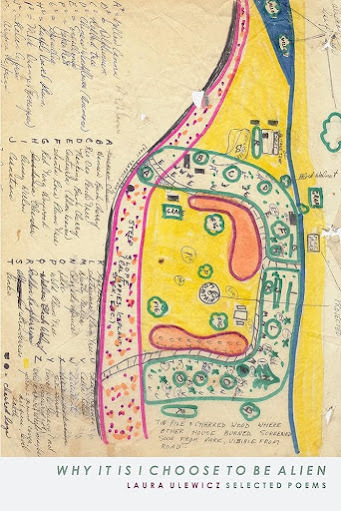Laura Ulewicz, Why It Is I Choose To Be Alien: Selected Poems, ed. Stephen Vincent
Both from her and her archiveswhich, as literary executor, I ultimately helped to acquire, I learned more ofher history. She arrived in San Francisco around 1950, in her early 20s, definitelyon the run from Detroit, and never went home again. Was there child abuse? Her muchyounger cousin, Dona, whom I would meet after Laura’s death, said her fatherwas difficult. But her middle class home was full of books and a piano. She wasclearly bright; the parents wanted her to become a math teacher. She was nodoubt rebellious. Arrested for shoplifting what she later told Dona was a “sexydress,” her parents refused to pay her bail. A friend paid it and she marriedhim; they moved to Chicago where the marriage would not last. It is not reallyclear what she initially did in San Francisco. Gradually she migrated into aBohemian life whose center was in North Beach. Refusing to take an office job,she worked in nightclubs as a “camera girl.” She began to write a loose kind ofopen-ended verse and published in small, local magazines. Attractive, with athick head of whiskey dark hair and physically strong, people might havewondered if she had just wandered in off the family farm. Indeed, as the poemsclarify, her Polish ancestors were peasants. (“My proper source, my pastmadness. What do they know that I don’t? Defeat? Victory in it? That peopledie?,” Stephen Vincent)
 Iwas fascinated to go through this posthumous selected poems by American poet Laura Ulewicz (1930-2007), her
Why It Is I Choose To Be Alien: Selected Poems
,edited with a hefty introduction by San Fransico poet and editor StephenVincent (Delete Press, 2022). I hadn’t heard of Laura Ulewicz prior to receivingthis title in the mail, and Vincent’s introduction explains why: articulating asequence of misadventures and near-misses that caused her work to not be pickedup in one anthology or another that might have allowed her some furtherattention. Having fallen in with the Beat poets in San Francisco, her short biography at the Poetry Foundation website includes: “She had an intense love affair withJack Gilbert, who dedicated his first book to her, and she ran the I-Thoucoffee house on Haight-Ashbury in the 1960s. She was hospitalized in apsychiatric ward for a time, and allegedly escaped. Her first and only book, TheInheritance, was published in 1967; she published sparingly during herlifetime, although her work appeared in literary magazines in the US and theUK, in anthologies such as Richard Peabody’s A Different Beat: Writing byWomen of the Beat Generation (1997), and as broadsides in the Bay Areaduring the 1960s.”
Iwas fascinated to go through this posthumous selected poems by American poet Laura Ulewicz (1930-2007), her
Why It Is I Choose To Be Alien: Selected Poems
,edited with a hefty introduction by San Fransico poet and editor StephenVincent (Delete Press, 2022). I hadn’t heard of Laura Ulewicz prior to receivingthis title in the mail, and Vincent’s introduction explains why: articulating asequence of misadventures and near-misses that caused her work to not be pickedup in one anthology or another that might have allowed her some furtherattention. Having fallen in with the Beat poets in San Francisco, her short biography at the Poetry Foundation website includes: “She had an intense love affair withJack Gilbert, who dedicated his first book to her, and she ran the I-Thoucoffee house on Haight-Ashbury in the 1960s. She was hospitalized in apsychiatric ward for a time, and allegedly escaped. Her first and only book, TheInheritance, was published in 1967; she published sparingly during herlifetime, although her work appeared in literary magazines in the US and theUK, in anthologies such as Richard Peabody’s A Different Beat: Writing byWomen of the Beat Generation (1997), and as broadsides in the Bay Areaduring the 1960s.”Vincentstructures the collection chronologically across four sections, each of whichhold to a different geography and living situation for Ulewicz across herwriting life, opening with elements of the one and only collection shepublished, which appeared with Turret Books during the period she lived in London,England: “The Inheritance (c. 1960-1967),” “Expatriation (c. 1960-1964),” “California(c. 1965-1972)” and “Locke (c. 1973-1980).” There are conversations one couldhave about a history of women artists and writers that get set aside for thesake of male writers, a number of whom have found new readers through a varietyof readers, critics, editors and publishers taking it upon themselves to reclaimwhat had otherwise been lost, from Lorine Niedecker (1903-1970) and Mina Loy (1882-1966)to Anne Wilkinson (1910-1961), and, from Vincent’s introduction, there iscertainly that, combined with multiple shifts in her geography and livingsituations which prompted a shaky stability, too uncertain to maintain enoughties to keep a literary momentum flourishing, despite her ongoing output. Her work,as evidenced here, has a momentum, a propulsion, that keeps pushing, even beyondthe ending of her sharp, critical, observational and occasionally caustic,first-person lyrics. She existed, and she wrote, and these poems are worthreading, and worth savouring. From that opening section:
TAKE 5, DETROIT
Down from the cosmos ofthese abstractions, TRACK IN
To this imperturbable armof the orange machine.
This is the first of thebeasts: Slave-kind of that
Prosperity by which weare doomed to freedom.
Inch along the arm withyour lens to the jaw-hand.
It is noon. The jaw restsraised and silent.
CUT to the sun where onebird esses then glides
Slowly down to light onthe knuckles. Follow
The bird, its down-flitto the fence. The place
Where all things mesh isthis galvanized fence
Within which my motherkneels to set out
Gladiola. Beside it sheknitted sweaters
For some godling tooutgrow in casual hours.
that was her serious business,was her prayer
While the orange machinegauging a pit next door
Made mood music, moodmusic, mood music.
Freedom is what she knitthis fence against.



